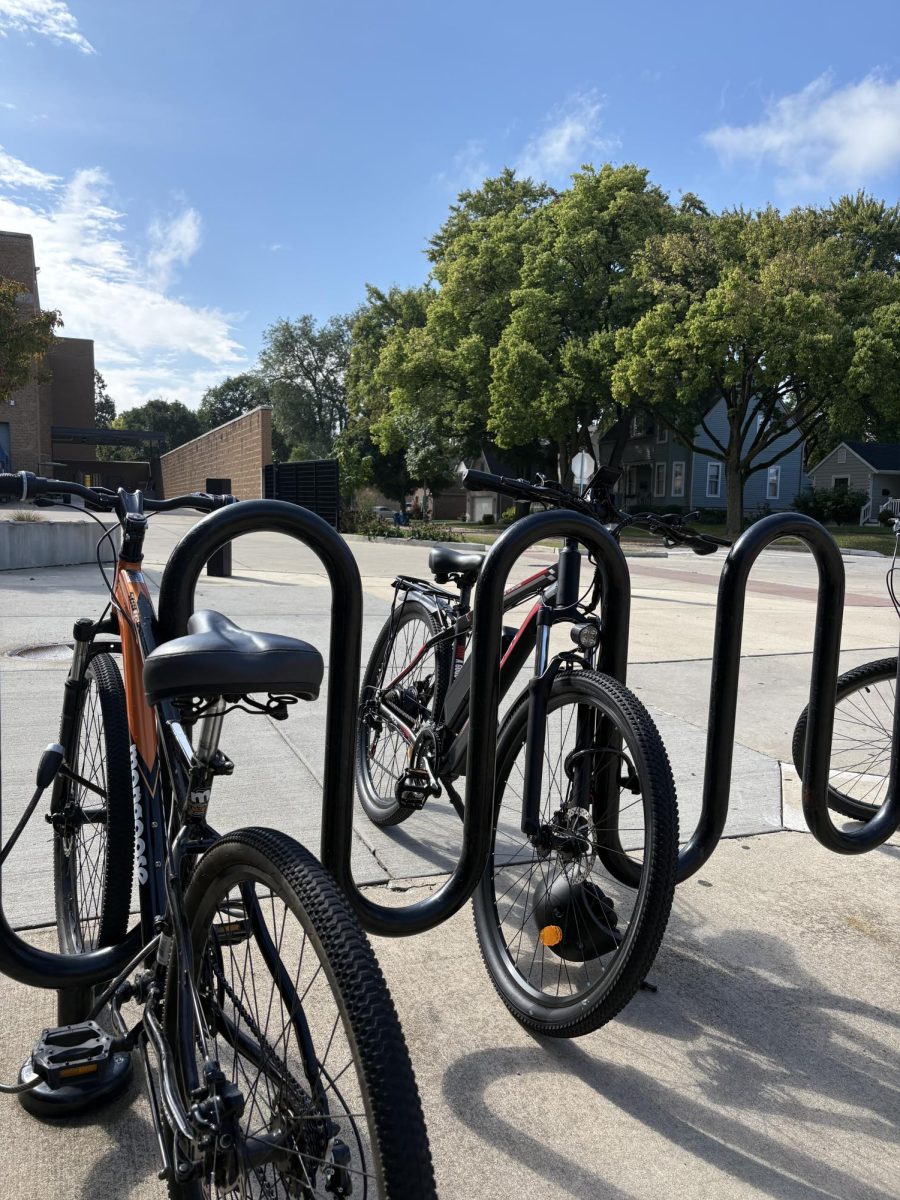Bridging the gap between classes: Teachers push for consistency in classes
May 25, 2017
As junior Chloe Mason walks into her AP Language class, she plops into her desk ready for class to begin. Just across the hall, junior Austin Moca mopes into the same curricular class, but his hands are sweating as he stresses for what is to come.
While both Mason and Moca are in the same curricular class, Mason’s grade is thriving with an A in her class, and Moca has been struggling with his writing assignments and discussions. This does not solely depend on the students themselves, but about the curriculum that is taught and how it is graded.
In Mason’s AP Language class, the majority of a student’s grade stems from in-class essays, according to Mason.
“Our class tends to just have essays, but other classes have question-response journals, and projects every other day,” Mason said.
On the other hand, Moca’s AP Lang class relies most heavily on class discussions.
“We’ve been doing the synthesis essay, quotation essays, stuff like that. We’ve had a number of in-class essays that we wrote that have been the majority of our grade. We’ve only had one or two tests, so those aren’t really a big factor. We have a lot of discussions on books, so essays may not be the most heavily relied-on, but if you don’t do well on an essay, your grade will definitely fail,” Moca said.
Since being in the class, Moca’s grade has increased as the year goes on.
“At the beginning of the year, I wasn’t very good at essays, but now that I’ve been in this class, I’ve been able to write them a lot better. If you don’t really follow the curriculum in the class, it will affect you negatively. Plus, [my teacher] is probably one of the hardest graders, so it varies,” Moca said.
As far as teachers go, the English department, representative of the whole school, has a plethora of different kinds of teachers. Junior Alexis Morman has taken an English class each year she has spent in high school.
Throughout her high school career, Morman has had three different English teachers.
“It’s almost 100 percent subjective; you’re writing because of the way your teacher prefers it. I’ve had to change the way I write every single year just because of the way the teacher is,” Morman said.
While students’ grades tend to depend on the grading style of a teacher, like Morman pointed out, one constant is that the entire English department technically allows revisions, retakes and extra credit as a part of the curriculum, although not all teachers present those options to their students. One reason for this is because of one teacher’s opinions on retakes may differ from another teacher’s.
Another aspect is because some teachers don’t give tests or quizzes at all. “We don’t have your generic tests. We [write] essays about every month or so. It actually helps our grade, because we put more effort into them,” Mason said.
Chris Bronke has been the English department chairperson for the past five years, and has never mandated anything to do with student assessments.
“There’s probably no way to generalize what the entire department is doing in terms of retakes. That, I would say, we’re kind of all over the place with,” Bronke said in an Omega interview.
Junior Emily Blanchard has been in an honors or AP English class all for all three years of her high school career.
“From my experiences, every class is different and what you do is very different. For example, in my freshman English, my friends [were] in other classes, and it was like we were in completely different classes. We weren’t really learning the same stuff, even though we were in the same [course],” Blanchard said. “It all depends on what teacher you get, because all teachers are different.”
Teachers across the district have the freedom to decide what assignments are worth the most points, if their final exam is going to be worth ten percent or 20 percent, and/or if they allow test retakes.
“While the district has a philosophy about what is good assessment practice, there is no policy. For me as a department chair, I don’t feel it’s right to create a policy when, as a district, we don’t have one. I’d like to have [a policy],” Bronke said.
The English department is not the only department with policies differing from class to class. The math department, overseen by chairperson Jonathan Heldmann, allows each course to make its own rules regarding grading.
“Each course sets its own policy, but, in general, the department expectation is that there be some opportunity for quiz corrections that can improve your grade, but no extra credit, and for most courses, no test corrections or retakes,” Heldmann said.
While there is no set policy for the math department as a whole, each course is consistent with its curriculum expectations.
“Again, there’s no specific departmental policy, [but, for example] the Math 3 teachers would all say ‘we’re gonna have five tests this semester’ and all together, those tests will count for 60%, 50% of the grade,” Heldmann said. All of the policies are decided on by the help of Heldmann and other course teachers.
Along with a grading consistency in each class, there is also the constant fact that the final exam is worth 20 percent of a student’s overall grade, unless it is an AP class. Heldmann also decided to change the grading system for Math 1, Math 2 and Math 3. An 89 percent is considered an A, a 79 percent is considered a B, and so on.
“I did that when we started the new courses, because [they] were more challenging than the previous courses of Algebra and Geometry and Algebra II. It was a way to provide an opportunity for students to have more flexibility. That way, nobody argues about ‘well, she got an 89.3 percent but I got an 89.6 percent and one person gets an A and one person gets a B. Or one teacher rounds and one teacher doesn’t.’ 89-anything [is an] A,” Heldmann said.
For all science inquiries, Michael Heinz is the chairperson that oversees all policies in his department.
“As a practice, our teachers lean on the side of not giving extra credit. However, what we try to do is in each curricular area, we try to get all the teachers to talk and discuss the best practices for assessment and for teaching and learning. We hope that out of [those] discussions comes the idea that they’ll be consistent within a curricular area. I strongly encourage that,” Heinz said.
As for how these meeting make each curricular class consistent, teachers discuss giving a standard amount of homework, tests, and quizzes.
“Our teachers do a really nice job with that,” Heinz said. “In teaching and learning, and it’s a pretty progressive point of view, they need to moderate their course and figure out where their students are at that particular point and time.”
Junior Hannah Kutchek is a student in AP Chemistry. Rather than taking a final for her class, students take an alternate assessment.
“Our final is based on a multiple choice final that we already took, and it’s also based on this huge lab that we’re doing that’s like a month long. So, we don’t have to take a final on the final day,” Kutchek said.
In the same curricular course, senior Maria D’Ambrose also had to take this alternate final. “There’s no final that we actually have to go in for, but just a really big lab that we all have to do. Seniors have to do the lab but they don’t have to do the write-up. It still counts as a final grade for a senior, even if they have a 70 percent or higher,” D’Ambrose said.
According to Heinz, the entire goal of a teacher is to maintain a systemic equity.
“The district wishes [classes were] consistent, but it’s very difficult to put the whole thing in practice. We have some curricular areas that are further apart than others. In all of our curricular areas there’s always room for improvement to align to a greater degree. That’s something that will never be perfect, but it’s some of our driving work. That’s what we try to do,” Heinz said.
Despite some inconsistencies in classes, some students’ grades have become better throughout the year. “I think, because I’ve gotten a lot better at essays than I used to be, [my grade] has been slowly increasing, it’s been affecting me positively in the long run,” Moca said.
To fix the inconsistencies in classes, Bronke has a possible solution to the problem. To give students a fair chance at similar grades and a more consistent grading policy, Bronke suggests that all teachers of a specific class get together to discuss the assessments of each students.
“One of the things that we do that I’d like to do more of is have teachers look at the same paper. For example, all seven of the English I teachers spend an hour one day looking at student X. The more you have those conversations, the more you have a chance at normalizing,” Bronke said.

























